It’s now been almost 3 months since our friend, Shannon Christy, passed away while kayaking at Great Falls on the Potomac River. For me it’s been a tough few weeks. I realized only recently that I’m spending less than two hours a day visualizing my team of friends hauling on ropes with me hanging onto Shannon’s wrist underwater. In the days that followed, I was certain I was going to write this note as a form of therapy for myself, and to answer the dozens of e-mails and messages that I received – messages ranging from simple condolences, to appreciation for my role in the rescue attempt, to loaded questions or interviews regarding the course of events. Mostly, I was unable to deal with these at the time and would answer them en masse when I was ready, which I never did. But today a TV show about this incident will air on national TV in the US, so after a few days of rising anxiety I’ve decided to put a few thoughts down and perhaps pre-empt questions that will arise.
Typically, I’m not one to say very much in the wake of death. Most times I choose silence, but that doesn’t mean that I don’t have a storm of thoughts swirling around in my head. Strangely enough, although I’ve lost much closer friends than Shannon, and also been face-to-face with death too many times, this incident has had a far more profound effect on me than any other. In part it’s because of the pure injustice of whom it happened to, but also because the pointless loss of friends has a cumulative effect, eventually leaving me wondering whether it’s all worth it. Perhaps it’s also because of where I am in my own life and where my priorities lie? Maybe I’ve adapted my perspective on the risks we take and the tragedies that sometimes unfold. Either way, Shannon’s death has had me thinking, and got me writing.
I first met Shannon in early 2012 at the winter X-Games, of all places. She even wrote a blog entry about it HERE Classic! What I remember about that day was that within seconds she had made my day just a bit better. I was left smiling. I didn’t realize it at the time, but I later learned that that was the experience of everyone she met, always. Indeed we love to say good things about people after they die, but thankfully what I have to say here is all stuff that I verbalized before she passed away: Each time she met someone, she was positive, smiling and putting her best foot forward. She truly lit up every circle she walked into. Not only can’t I say that for myself, I don’t even try, and I wouldn’t even know how. But in kind of a sad irony, it’s this amazing personality that drew me to her and her to us, setting the course of events in motion that ultimately ended her life.
Since early this year, I’ve been regularly visiting Washington DC to document the paddling scene there. Although there has been plenty of footage shot, I felt that the story of the DC paddling scene had never truly been captured or told. As an outsider I was convinced that the history and present day community there was a home run for a video/TV segment. I had a few attempts at selling the project to sponsors and media outlets, but without luck I went ahead on my own dime thinking that once I had some good footage in the can, perhaps I’d have an easier time pitching the idea. Worst-case scenario I could just make a short film for the web.
After a visit in early June, Jason Beakes called me up and said that a producer at CBS had contacted him with the idea of doing a 60-minutes segment on the paddling scene in DC. She’d seen the same values that we had and was keen to take a look at some footage. I sent a sample and after a few calls we realized that we could work together to tell the story. We chose to focus on a few key characters in DC and build the story around the run-up to the Great Falls race, and also bring in a few out-of-towners to share their view. After introducing the river and DC, we would cover the National Park Service, Fire and Rescue, and the Park Police Heli unit’s role on the river. We’d feature local legends like Tom McEwan and Jason Beakes and meet visitors like Pat Keller and EJ. Each person needed to bring a unique role to the story… And we wanted to feature a couple of female paddlers: Enter Shannon Christy.
We invited Shannon to spend the week with us not because she was fast nor for her ability to plug big drops, but for her personality. We believed that she embodied the best of what the kayaking community has to offer – a good ambassador for us all, perhaps even a representation of what we hoped people would think of us. She jumped at the idea, and Confluence Watersports kindly sent her on a working holiday. For her it was the chance to paddle a section of whitewater she’d always wanted to paddle and she was excited to film and paddle with Jason and me – a chance to showcase her skills and herself – she told us that.
On Tuesday morning we all did a sit down interview with the CBS crew. Shannon talked in depth about her life and what kayaking meant to her, a serious interview with a serious host, David Martin. Later that day it was my job to shadow Shannon and Jason down the river for her first run of the falls. She had great runs. All smiles!
Wednesday. Shannon had a little work to take care of in the morning and then more runs of the falls. By the end of the day we felt like we’d done a good job of building her profile.
Thursday. After coffee she told me that she’d do some work in the morning and see how she felt in the afternoon. She considered resting up that day.
I headed off to spend the morning with the show’s host and Tom McEwen for a kayak lesson at the Maryland Chutes. Boring stuff, I know, but a key little piece to the story. We felt like it was important to show the viewer that kayaking is not a stunt: Just like other sports, it has teachable moments that almost anyone can learn. When I got off the water I received a text from Shannon. She was keen to paddle. We arranged for her and Jason to approach from the MD side while I would approach from the VA side so that I could grab a few pick-up shots with my 600mm lens. Then I would paddle over to the center to join them.
Here is the accident report at American Whitewater
When I arrived at the river I started setting up my camera. There was no sign yet of Jason who would run the MD channel first while Shannon approached the center lines with Will Seeber, another top DC boater. As it turns out, Shannon decided to go for a lap of the center lines while she waited for me to arrive and set up. Just as I got done setting up my camera I saw a commotion among onlookers that drew my attention to a kayak floating below the falls. I really didn’t think much of it at first – I guessed someone had taken a swim, so I peered over towards the VA channel to see if I could see the swimmer. Once I saw Rangers talking to tourists I figured something was wrong and after some questioning learned that someone had swum into ‘Subway’. We all know that ‘Subway’ is a deadly rock sieve. At this point Jason was arriving on scene and I still didn’t know it was Shannon. I looked through my lens to see if I could see anything in Subway, nothing. My brother was with me so I had him look after my camera while I ran for my gear. When I met Jason on the bank I learned that it was Shannon. Somehow it seemed worse. At this point it suffices to say that we got out to the channel and started setting up anchors and a Z-Drag while paddler after paddler arrived to help as the word spread around town. The Montgomery Fire and Rescue Dept. tried to stop us from attempting the rescue but we went ahead anyway while the National Park Police Heli stood by overhead. Then came the gannets… To our dismay, an NBC news heli streamed our rescue live to news channels across the country, but fortunately they were on a refuel at the moment that we got Shannon out of the water. Sadly, it was too late. Three and a half hours had passed.
In the days that followed, Shannon’s parents and brothers travelled to Washington DC. The first thing that struck me about them was that they had come with the idea of offering support to Shannon’s friends rather than expecting answers from us. Yes, we all cried together, but their strength and smiles even through the worst of losses showed us all that the apple doesn’t fall far from the tree. It gave us all such strength to realize that even those who’d lost so much more than any of us were still able to smile and carry on. Their smiles, even through tears, honored Shannon far more than any of the clever words we could come up with. We held a memorial on the river on the day that was supposed to be the Great Falls Race and a few of the boys and girls reopened lines on the falls while most of us simply tossed flowers. It was an incredible coming together of the paddling community and once again the DC paddling scene showed it’s best side.
Now time has passed and we’ve all done some healing. It’s true, time works wonders. But that time has also been used for CBS editors to piece together a story from the footage that they obtained during the week we spent with Shannon. Anytime there’s a death on an expedition or during a filming project there is the difficulty of deciding whether or not to proceed with a show. My assessment is that no matter what, there will be a story written, or a show made, so those close to the project should embrace this fact and at least have some control over how it plays out. If you keep it ‘in-house’ you get to keep it away from the gannets, the leach effect. On my Congo Expedition I wrote a very clear will on how, in the event of my death, the story should be told, who should edit, how it will be paid for and who would own it. I also left ‘the keys to the safe’ – ATM codes, signed checks etc. What happens when this isn’t done is you end up with bullshit artists glorifying themselves and sensationalizing the incident, often without all the pieces in place to even tell the story accurately, let alone well. I’ll spare you my list of examples!
So where are we then with the 60-minutes CBS crew? Well, fortunately the story was constructed in a way that could accommodate any twist, without needing to fabricate material. Almost daily I thank the lucky stars that this took place under the watch of such an accomplished and credible team, rather than some junky magazine show. It reminds me that choosing the right film crew is as important as choosing your safety team. This show’s producer is Mary Walsh, thankfully! Just last night Mary added another Emmy to her shelf of awards for her story on Medal of Honor recipient, Dakota Meyer. Her DuPont Awards (the broadcast equivalent to a Pulitzer), don’t come for nothing, but although she may have spent much time in the world’s gnarliest war zones, I can tell you first hand that she was deeply affected by this tragedy. She too was infected by Shannon’s smile. I said to her in recent weeks that a measure of success for this show is if Shannon’s parents can watch it and feel that it serves Shannon’s memory well, so last weekend she travelled in person, alone, to screen the show privately with Shannon’s family. To be sure, it was not easy for them to watch and I’m guessing it rekindled feelings of pain, even anger, that we have to sit and watch through this rather than an awesome show about the DC paddling capitol. But hat’s off to Mary for bucking up and bringing the show to Shannon’s family in person!
I’ve seen much of the raw footage – I shot the last ever shots of Shannon, and I’ve watched the footage of our rescue attempt many times, but I do not know what the show will look like. As soon as I became a part of the story, I was no longer allowed to see the script or give input on the edit – a CBS policy to protect journalistic integrity. What I predict is that it will be very ‘matter-of-fact’ and journalistic in nature. I think that there will be some hard truths without sugar coating and viewers will be left to decide for themselves how to feel. What I hope is that it will simply be accurate, and I’m optimistic. It will contain irony, but let’s hope that we can all watch and learn while at the same time experiencing some of Shannon’s last moments – the good ones, the ones where she’s doing what she did best: ” I just love smiling, it’s my favorite.”
This is a tragic story, but it was a day just like any other day at Great Falls. There was nothing sinister that day and while we can all picture scenarios that would have prevented Shannon’s death, nobody did anything wrong. It was an accident and we all played out of our boots in our attempts to save her. Nothing more could have been done after the fact.
Now this is the part where I’ll spare you the cliché one-liners: “She died doing what she loved!” or “The rewards outweigh the risks!” No! I’m calling bullshit. I want to share my view and offer some unsolicited advice: Shannon knew about ‘Subway’ channel and it’s dangers, but she did not realistically stack the possibility of death against the fun that she might have. She did not knowingly risk her life for fun… She pushed that part of the river aside in her mind, she assumed that she would not end up there, and if she were right, the reward would indeed outweigh the risk. But she was wrong. That is not an indictment on her judgment, she did exactly what we all often do, it’s just that the unexpected occurred and only she knows exactly how or why, or if there was a game plan from there. Perhaps our lesson is to try being more prepared for the unexpected?
I’ve only knowingly risked my life a few times ever, and I’m not necessarily proud of all of those times. Yes, things can go wrong, but many top paddlers have never truly risked their lives: “If you mess up, you die” usually translates to something like, “Nah Dude, I’m just not feelin’ it, I’m gonna walk.” That’s a fact, and although the pictures are impressive and the risk of injury is prevalent, we honestly don’t actually risk our lives that much. If we did, it would be a slap in the face of our loved ones: we’re supposed to take the safe way home! You knowingly risk your life when the alternative to death is worse than death, not when the alternative is, “sick, dude!” If you think that intentionally risking your life for fun is worth it, then I’m pretty sure you’ve never given CPR, zipped up a body bag, or called the parents of your deceased friend.
Here’s the advice: Yes, push yourself, but only for yourself. Test yourself and have fun, but don’t feel like you need to risk all, or put a part of the river aside in your mind to check some box. I assure you, the moves you invent, the designs you create and the dozens of 1st D’s you do will be forgotten. The next generation will roll in and won’t know who you are, and the marketing guy at your ‘sponsor’ will change, and the new guy won’t even know you existed, let alone that you helped build the brand. That is all fine, but just know that the risks you take are ultimately only to build your character and fill your personal photo album. Do not believe that your exploits will make you some hero legend that lives on into eternity. That magazine cover will sit at the bottom of a box in your basement. Just like nobody will remember that you portaged that drop, they will forget that you ran it. Know that if you die on the river, there’s a good chance people will paddle right by that spot without even knowing your name. I get to tell you this because I’ve accomplished more than most, as a professional kayaker, and I can promise you that even my awesome sponsors and my biggest fans don’t remember everything that I’ve done. That’s completely OK, but it means that I should be careful what or who I risk my life for.
So what am I trying to say? Stop taking risks? No. When us kayakers go out on the river, only we know what it is that we receive from our time on the water. Most of the time it’s worth it, it’s worth giving up so much for, but let’s keep our own individual perspectives carefully balanced. Remember that the adventure, the camaraderie and the sense of accomplishment is there to be had, but so is the worst case scenario – the unexpected. If we’re mindful and prepared for that, we’ll be just fine, Great Falls will be fine and the DC paddling community will thrive on. We still get to run the shit, but let’s step back and be better at not pitting our passion directly against death, because when the scale tips the wrong way it’s not worth it.
Steve Fisher is an award winning director & producer and has aired on television in over 90 countries as well as the USA, NBC & Universal, His homepage is here
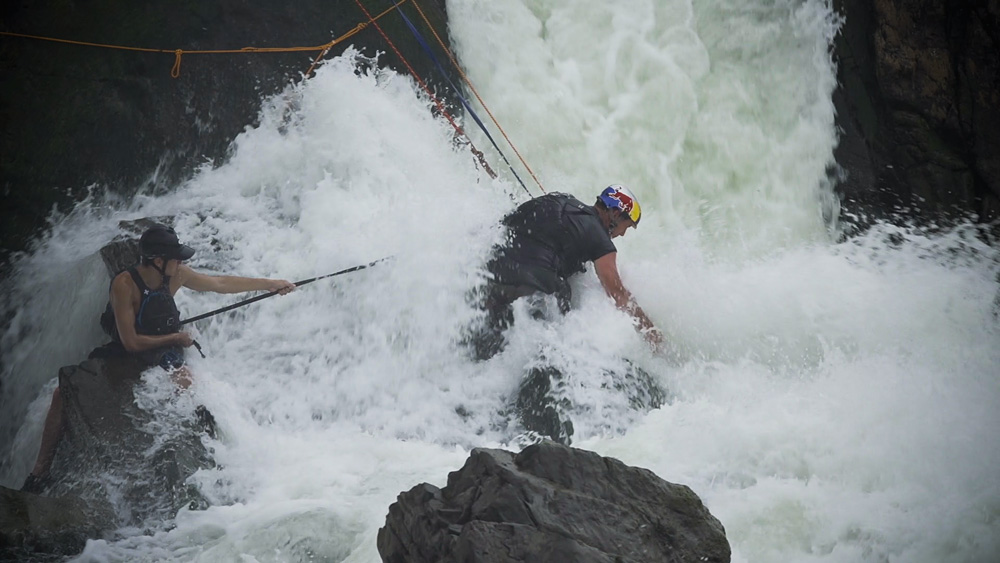
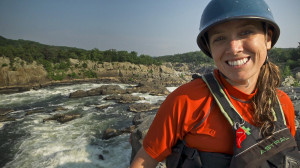
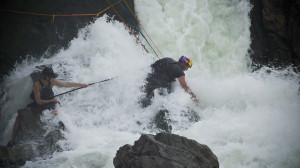
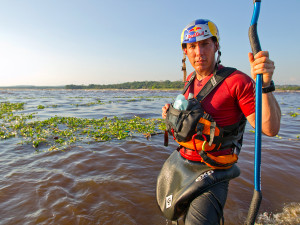


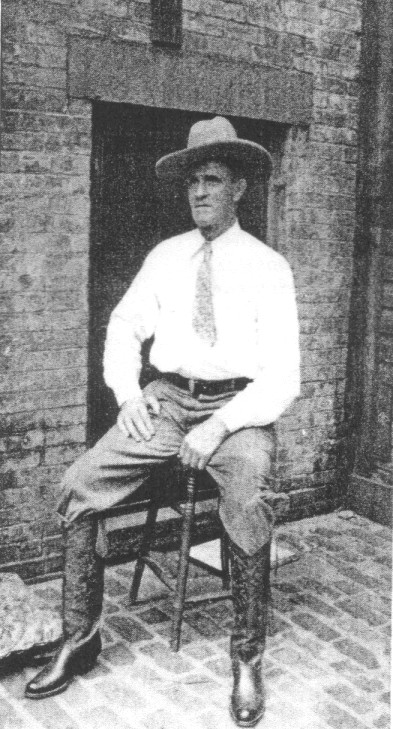
God Bless Shannon Christy….may her Spirit live on !
My condolences.
Sad indeed–she was a lovely soul.